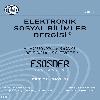Bazı Özel Öğretim Yöntemlerinin Lineer Cebir Öğrenimine Etkileri
Bu çalışmada, üniversitelerin matematik ve fen ağırlıklı bölümlerinin bir veya ikinci sınıfında okutulan li-neer cebir dersi için geliştirilen öğretim yöntemlerine değinilmiş ve bu yöntemlerin bir yıl üzerinden uygulaması ve değerlendirilmesi yapılmıştır. Bu amaçla, Van Yüzüncü Yıl Üniversitesi Eğitim Fakültesi İlköğretim Bölümü Ma-tematik Öğretmenliği anabilim dalında 32 öğrenciden oluşan 2-A (deney grubu) ile 32 öğrenciden oluşan 2-B (kont-rol grubu) olmak üzere iki şube belirlenmiştir. Lineer cebir konuları, kontrol grubuna geleneksel bir yaklaşımla öğ-retilirken, deney grubuna ise özel öğretim yöntemlerinden faydalanarak öğretilmiştir. Kontrol ve deney gruplarına ön-test ve son–test uygulanmış ve sonuçlar betimsel istatistik tekniklerinden “t” testi ile analiz edilmiştir. Sonuçlar, öğrenilmesinde her zaman zorluklar yaşanan lineer cebir dersinin öğretiminin, yeteri kadar güçlü ve bütün programı kapsayacak aktivitelerle desteklenerek yapılması durumunda, öğrenciler üzerinde olumlu değişik-likler yapabileceğini göstermiştir.
Effects of Some Teaching Methods to Learning Linear Algebra
In this study, it is given a teaching program for linear algebra course taught in the first or second year at mathematics and science-oriented department of universities, and this program experimented over a whole teaching semester for one year. For this purpose, 32 students in 2-A class (experiment group) and 32 students in 2-B class (control group) in Mathematics education of Primary Department in the Education Faculty of Yuzuncu Yıl University were assigned as the sample of the study. While linear algebra was received in the traditional teaching method for the control group, it was taught by using some teaching strategies for the experiment group. More over, it is stressed to the basic points of linear algebra curriculum. A pre-test and post-test exam was applied to both groups and the data obtained was analyzed with the help of descriptive statistics of the “t” test analysis. The conclusions deal with that if the teaching of linear algebra, which has always been difficult, is made by the activities which are strong enough and covers the different part of the curriculum, Than It can be possible to make student’s practice changes in a positive way.
___
- Adalıoğlu, U., Bekçi, E. Ve Korkmaz, H. (2001). Lise 3 Matematik (üçüncü baskı). İstanbul: Milli Eğitim Basımevi.
- Boor, D.B, (2002). An alternative approach to (the teaching of) rank, basis, and dimension. Linear Algebra and its Applications, 146, 221-229.
- Carlson, D., Johnson, C., Lay,. D. ve Porter, A. (1993). The Linear Algebra Curriculum Study Group Recommendations for the First Course in Linear Algebra. College Mathematics Journal, 24, 41-46.
- Dorier, J.-L. (1995). A General Outline of the Genesis of Vector Space Theory. Historia Mathematica, 22, 3, 227-261.
- Dorier, J.-L. (1998). The role of Formalism in the Teaching of the Theory of Vector spaces. Linear Algebra and its Applications, (275), 1, 4, 141-160.
- Dorier, J.-L. (2000). On the Teaching of Linear Algebra. Dordrecht: Kluwer Academic Publishers.
- Dorier, J.-L., Robert, A. Ve Robinet, J. (2000). The Meta Lever. (edit. J.-L. Dorier). On the Teaching of Linear Algebra (ss. 151-176). Dordrecht: Kluwer Academic Publishers.
- Dorier, J.-L., Robert, A., Robinet, J. Ve Rogalski, M. (2000) a. The obstacle of Formalism. (edit. J.-L. Dorier). On the Teaching of Linear Algebra (ss. 85-94).Dordrecht: Kluwer Academic Publishers.
- Dorier, J.-L., Robert, A., Robinet, J. ve Rogalski, M. (2000) b. On a Research Program about the Teaching and Learning of Linear Algebra in First Year of French Science University. International Journal of Mathematical Education Sciences and Technology, 31, 1, 27-35.
- Harel, G. (2000). Principles of Learning and Teaching of Linear Algebra: Old and New Observations. (edit. J.-L. Dorier). On the Teaching of Linear Algebra (ss. 177-189). Dordrecht: Kluwer Academic Publishers.
- Moore, G. (1995). The Axiomatization of Linear Algebra. Historia Mathematica, 22, 3, 262-303.
- Robert, A. (2000). Level of Conceptualization and Secondary School Mathematics Education. (edit. J.-L. Dorier). On the Teaching of Linear Algebra (ss. 125-131). Dordrecht: Kluwer Academic Publishers.
- Rogalski, M. (1996). Teaching Linear Algebra: Role and Nature of Knowledge in Logic and Set Theory which Deal with Some Linear Problems. The Proceedings PME 20 (V., 4, ss. 211-218). Valencia Universidad, Spain.
- Yılmaz, A., Altıntaş, O., Çoker, D., Yıldırım, F. Ve Zirek, F. (1991).Matematik III. İstanbul: Milli Eğitim Basımevi.
- Derive. Soft Warehouse Inc. 3615 Harding Ave., Suite 505 Honolulu, Hawaii. Mathematica. Wolfram Research Inc. P. O. Box 6059 Champaign, IL Matlab. The Math works Inc. 21 Eliot St., South Natick, MA.
- Yayın Aralığı: Yılda 4 Sayı
- Yayıncı: Cahit AYDEMİR
Sayıdaki Diğer Makaleler
Türkiye'de Koruma Yasalarının Tarihsel Gelişimi Üzerine Bir İnceleme İnceleme
Can Tuncay AKIN, D.Türkan KEJANLI, Aysel YILMAZ
Bilgi Toplumu Bağlamında Türk Atasözlerinde “Eğitim” ve “Bilgi” Kavramları Üzerine Düşünceler
Ninive 5 Kültürü'nün Güneydoğu Anadolu Bölgesi'ndeki Yayılımı
Gökçeada-Yenibademli Höyük Kazısında Bulunan Makara
Bazı Özel Öğretim Yöntemlerinin Lineer Cebir Öğrenimine Etkileri
Atınç OLCAY, Kurban ÜNLÜÖNEN, Müjdat ERTÜRK
Mıhlı Çayı Havzası'nın Jeomorfolojik Özelliklerinin Jeomorfik İndislerle Analizi
